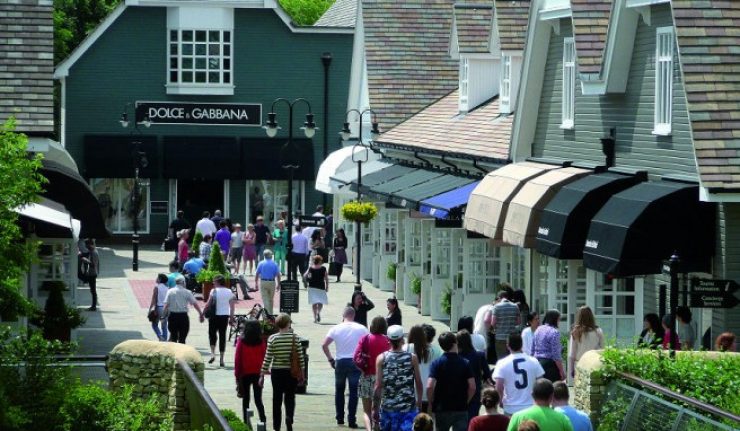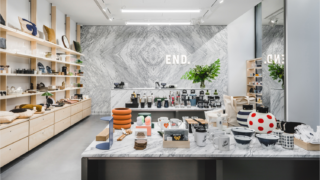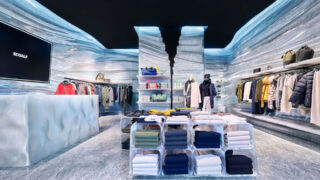Investments in outlet malls increase
LONDON, United Kingdom — Australian tourists Erica Kim and Michael Cai walk out of Bicester Village outlet mall near London loaded down with purchases including Jimmy Choo boots, Bally shoes and a dress. They figure they’ve saved about 1,000 pounds ($1,500) compared with shopping at home.
Outlet centres across Europe are attracting visitors from as far away as China and Brazil with discounts of 60 percent or more on year-old apparel by luxury labels retail like Gucci and Prada, as well as on jewelry and other goods. That’s lifting revenue at companies backed by investors such as Carlyle Group LP, Hammerson Plc and Henderson Global Investors, and fueling the industry’s expansion even as conventional retailers struggle.
“When times are tough, people still like to shop, they still like brands,” said Robert Hodges, head of European retail asset management at Carlyle, which bought London-based outlet operator Freeport Group in 2007. “We’ve seen consistently better performances in terms of footfall and overall turnover at the centres and, because we’ve got percentage rents, that filters down to us as rental payments.”
Revenue at European retail malls climbed to 10.8 billion euros last year, a 60 percent gain from 2007, according to estimates by industry adviser FSP Ltd. Owners and operators benefit more from rising sales than malls with full-price retailers because they keep as much as 18 percent of the price of each item sold by the brands at their outlets. There are 201 outlet malls in Europe, excluding Russia and Turkey, FSP said in January.
Increased Spending
Sales at the nine luxury-brand outlets built and operated by London-based Value Retail Plc, including Bicester Village, almost tripled to 1.7 billion euros in the five years through 2012. Spending per visit rose 9.4 percent in 2012. The closely held company, Europe’s third biggest outlet-mall owner by floor space, is forecasting a 20 percent gain in sales this year, according to Chairman Scott Malkin.
Rising revenue is increasing the value of the company’s assets at a time when conventional stores and shopping malls in the U.K. are depreciating. Hammerson, the London-based real estate investment trust that owns 22 percent of Value Retail, said last week that the value of its stake increased by about 18 percent last year.
Shopping retail mall sales in mainland Europe fell 34 percent to 6.1 billion euros in the first half of 2012, according to data compiled by Real Capital Analytics Inc. U.K. commercial property values fell by 3.1 percent last year and retail assets declined 3.2 percent, according to Investment Property Databank.
Growth Prospects
Henderson Global Investors’ European outlet fund has generated annual returns of about 12 percent for investors since it started in 2004. The fund, which owns eight malls with McArthurGlen Group in Europe outside of the U.K., is due to mature next year. Henderson is in talks with clients to renew the investment pool rather than sell the properties, according to Andrew Rich, who manages the fund.
“There’s a lot more growth to come out of those assets,” he said.
The fund in September opened a 120 million-euro centre in the German town of Neumuenster, about 57 kilometers (35 miles) north of Hamburg, in a joint venture with London-based McArthurGlen, Europe’s largest outlet-mall operator. The fund is considering expanding the mall and may increase the number of stores at a center near Berlin, Rich said.
Henderson’s fund sold outlet malls in 2010 and 2011 at Troyes and Roubaix in France to Resolution Property Plc. Closely held Resolution, based in London, also bought Rosada Factory Outlet, 50 kilometers south of Rotterdam, in December from CBRE Global Investors. The three properties have risen in value by about 25 percent to 200 million euros since they were purchased, Resolution director Peter Todd said.
‘Fantastic Potential’
“They have fantastic potential for income growth,” he said in an interview. Resolution may spend an additional 200 million euros or more on outlet malls, he said.
Outlet malls in Europe differ from those in the U.S. because they tend to have a greater proportion of shops selling high-end luxury products, Iestyn Roberts, chief executive officer of Freeport, said in an interview. U.S. centres are more likely to sell apparel made specifically for discount stores.
Luxury goods account for about 40 percent of sales in Europe’s outlet malls even though they occupy only 22 percent of the space, FSP estimates.
The U.S. outlet mall market is dominated by Indianapolis- based Simon Property Group Inc., the biggest shopping retail-centre owner, and Tanger Factory Outlet Centers Inc. McArthurGlen Group has 15 percent of the U.K. market, while Madrid-based Neinver controls 9 percent. Both companies are closely held.
Bargain Prices
For foreign shoppers coming to Europe, designer brands tend to be a bargain even without the discounts offered at outlet centers. The cost of 20 luxury items in China, including bags and watches, was 72 percent higher than in France, according to a 2011 survey by China’s Ministry of Commerce.
Demand outside of Europe for brands owned by companies like Burberry Group Plc and Prada SpA means that foreign shoppers spend twice as much per visit than Europeans, according to data compiled by FSP. Scarcity and factors like import duty boost prices in countries like China and Brazil, Freeport’s Roberts said. Tourists from outside the European Union can also claim back the sales tax paid on their purchases.
Parking was hard to find on a Tuesday afternoon in January at Bicester Village, about 50 minutes by train from central London.
Chinese Buyers
Australians and Chinese were among those looking at Gucci handbags reduced by more than 75 percent from their original price of 500 pounds. Women’s black ankle boots by Armani were 70 percent off and navy chalk-stripe suits by London’s Savile Row tailor Gieves & Hawkes were marked down to 495 pounds from 2,250 pounds.
“Things are so much cheaper here,” said Kim, the shopper from Australia. “You can get luxury retail brands for reasonable prices.”
Hayden Dong, a mechanical engineering student from Beijing, said he bought a Gucci purse at the center after comparing prices with those in China. Spending by Chinese visitors to the U.K. rose 31 percent last year, according to tourism services provider Global Blue.
Meyer Bergman, a London-based fund seeking to buy assets worth as much as 600 million euros, has hesitated to invest in outlet malls, according to Zsolt Kohalmi, its chief investment officer. Bergman has yet to purchase any because of questions about liquidity in the market and the types of investors that would acquire the assets afterward, he said.
Profitable Investment
Earnings at Freeport have tripled since it was acquired by Washington-based Carlyle, the world’s second-largest private- equity firm, for 155 million pounds in 2007, Roberts, the CEO, said in an interview. He declined to say how profitable the company is.
Freeport plans to add malls at Lyons in France, Duisburg in Germany and La Spezia in Italy, and may take over the management of underperforming outlets from other operators, he said.





Retail buzz c’est une superbe idée de blog (.fr) Bravo et bonne continuation. Francois